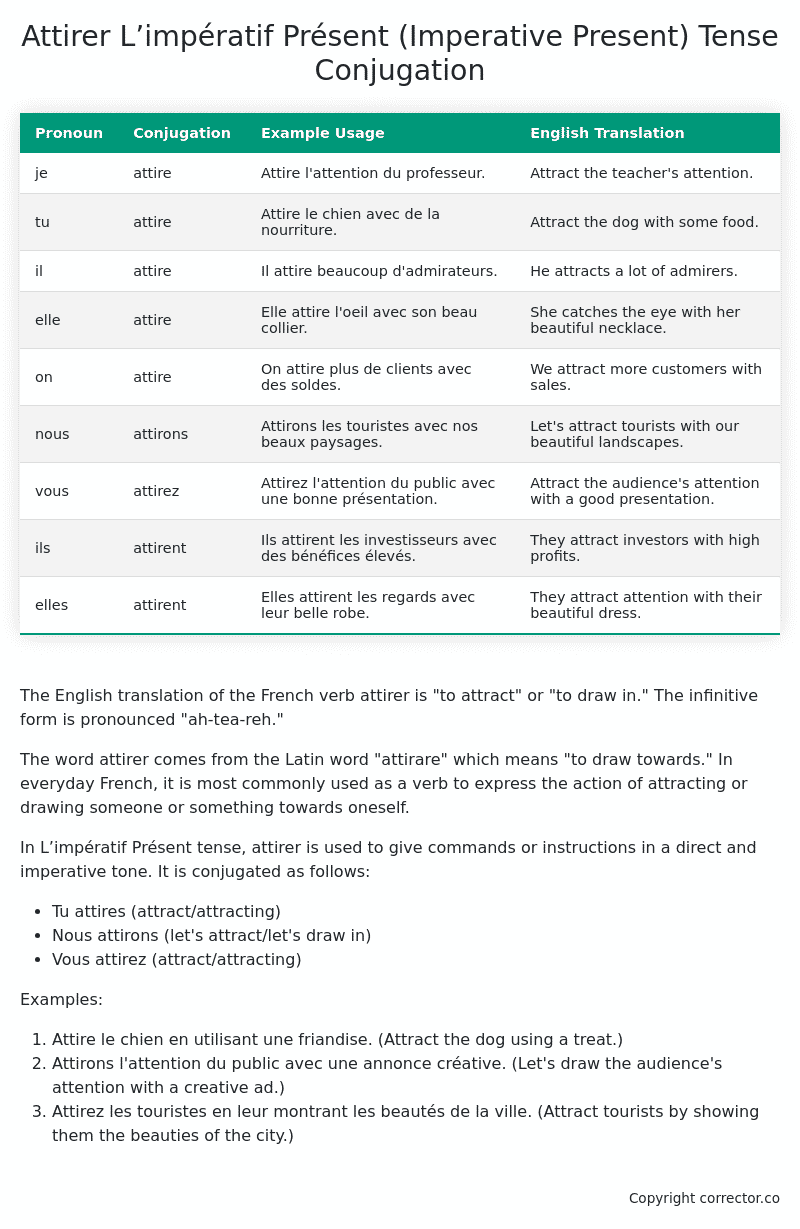L’impératif Présent (Imperative Present) Tense Conjugation of the French Verb attirer
Introduction to the verb attirer
The English translation of the French verb attirer is “to attract” or “to draw in.” The infinitive form is pronounced “ah-tea-reh.”
The word attirer comes from the Latin word “attirare” which means “to draw towards.” In everyday French, it is most commonly used as a verb to express the action of attracting or drawing someone or something towards oneself.
In L’impératif Présent tense, attirer is used to give commands or instructions in a direct and imperative tone. It is conjugated as follows:
- Tu attires (attract/attracting)
- Nous attirons (let’s attract/let’s draw in)
- Vous attirez (attract/attracting)
Examples:
- Attire le chien en utilisant une friandise. (Attract the dog using a treat.)
- Attirons l’attention du public avec une annonce créative. (Let’s draw the audience’s attention with a creative ad.)
- Attirez les touristes en leur montrant les beautés de la ville. (Attract tourists by showing them the beauties of the city.)
Table of the L’impératif Présent (Imperative Present) Tense Conjugation of attirer
| Pronoun | Conjugation | Example Usage | English Translation |
|---|---|---|---|
| je | attire | Attire l’attention du professeur. | Attract the teacher’s attention. |
| tu | attire | Attire le chien avec de la nourriture. | Attract the dog with some food. |
| il | attire | Il attire beaucoup d’admirateurs. | He attracts a lot of admirers. |
| elle | attire | Elle attire l’oeil avec son beau collier. | She catches the eye with her beautiful necklace. |
| on | attire | On attire plus de clients avec des soldes. | We attract more customers with sales. |
| nous | attirons | Attirons les touristes avec nos beaux paysages. | Let’s attract tourists with our beautiful landscapes. |
| vous | attirez | Attirez l’attention du public avec une bonne présentation. | Attract the audience’s attention with a good presentation. |
| ils | attirent | Ils attirent les investisseurs avec des bénéfices élevés. | They attract investors with high profits. |
| elles | attirent | Elles attirent les regards avec leur belle robe. | They attract attention with their beautiful dress. |
Other Conjugations for Attirer.
Le Present (Present Tense) Conjugation of the French Verb attirer
Imparfait (Imperfect) Tense Conjugation of the French Verb attirer
Passé Simple (Simple Past) Tense Conjugation of the French Verb attirer
Passé Composé (Present Perfect) Tense Conjugation of the French Verb attirer
Futur Simple (Simple Future) Tense Conjugation of the French Verb attirer
Futur Proche (Near Future) Tense Conjugation of the French Verb attirer
Plus-que-parfait (Pluperfect) Tense Conjugation of the French Verb attirer
Passé Antérieur (Past Anterior) Tense Conjugation of the French Verb attirer
Futur Antérieur (Future Anterior) Tense Conjugation of the French Verb attirer
Subjonctif Présent (Subjunctive Present) Tense Conjugation of the French Verb attirer
Subjonctif Passé (Subjunctive Past) Tense Conjugation of the French Verb attirer
Subjonctif Imparfait (Subjunctive Imperfect) Tense Conjugation of the French Verb attirer
Subjonctif Plus-que-parfait (Subjunctive Pluperfect) Tense Conjugation of the French Verb attirer
Conditionnel Présent (Conditional Present) Tense Conjugation of the French Verb attirer
Conditionnel Passé (Conditional Past) Tense Conjugation of the French Verb attirer
L’impératif Présent (Imperative Present) Tense Conjugation of the French Verb attirer (this article)
L’infinitif Présent (Infinitive Present) Tense Conjugation of the French Verb attirer
Struggling with French verbs or the language in general? Why not use our free French Grammar Checker – no registration required!
Get a FREE Download Study Sheet of this Conjugation 🔥
Simply right click the image below, click “save image” and get your free reference for the attirer L’impératif Présent tense conjugation!

Attirer – About the French L’impératif Présent (Imperative Present) Tense
Usage
Giving commands
Making requests
Offering advice
Expressing desires
Conjugation Formation
Interactions with other tenses
Want More?
I hope you enjoyed this article on the verb attirer. Still in a learning mood? Check out another TOTALLY random French verb conjugation!


